Leicester Objects
Before the Storm - Introduction
“We wanted to take stuff with us to remember everything. “
~ Anju Siraj
The objects and photographs Ugandan Asians brought with them speak of hard work alongside a relaxed lifestyle of evening walks, weekend trips, picnics and children playing freely outdoors – a unified community that shared joy and sorrow, and for whom religious divides did not matter.
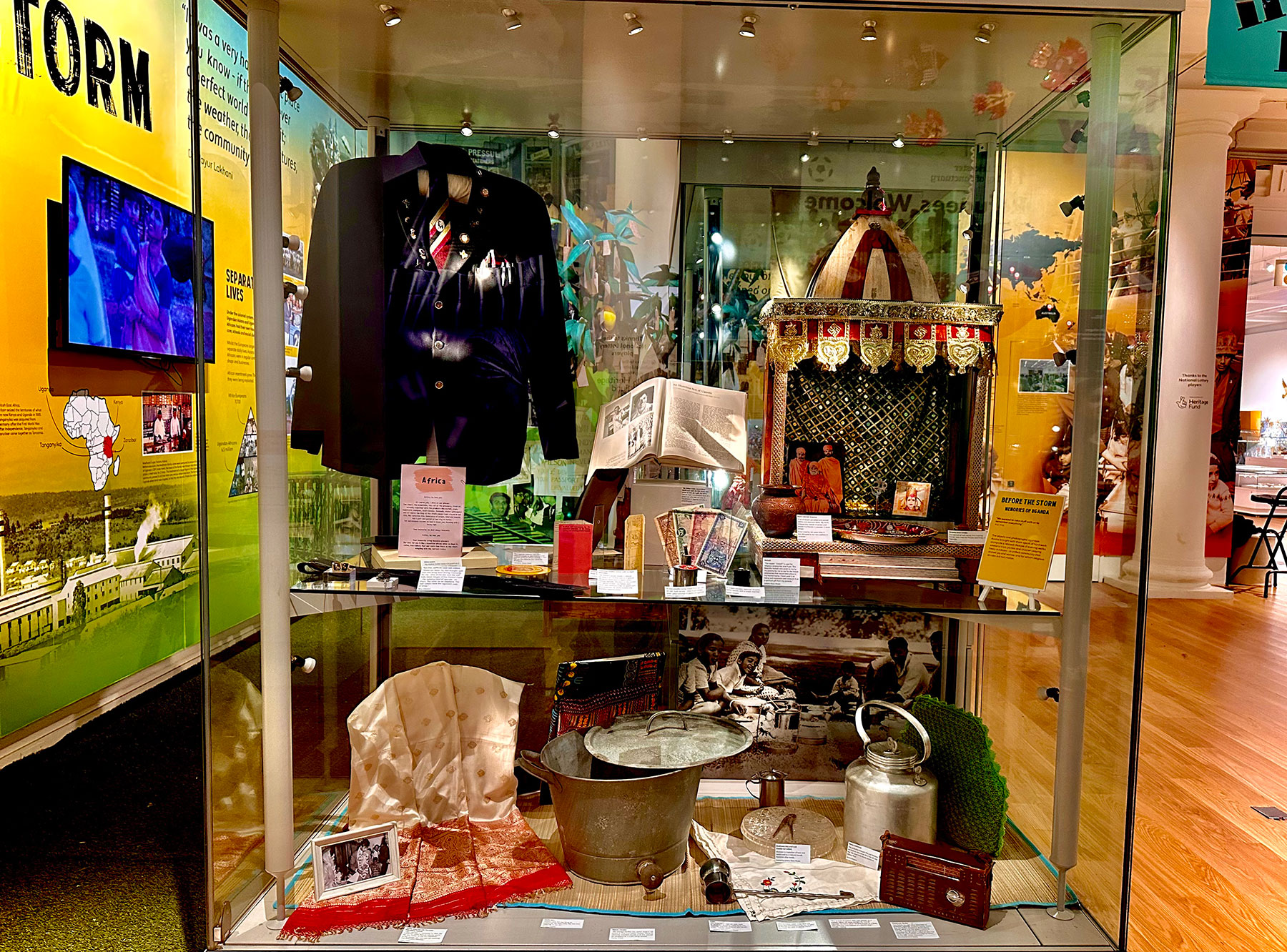
| White and red silk Panetar (Wedding Saree) “I got married in Kampala in 1965. My maternal uncle, Raman Mama, gave me this saree, as per our tradition. In the photo, you can see me wearing this beautiful Panetar.” ~ Usha Patel |
| Ugandan currency “Dad brought some Ugandan money with him in case we wanted to go back.” ~ Madhu Mistry |
| Kitenge shirt “I used to wear this shirt a lot in Uganda. I still wear it often, especially on Ugandan Independence Day.” ~ Bhupendra Parmer |
| Picnic Mat “Picnics were the big thing at weekends. We kept mats like this one rolled up in the car.” ~ Ranjan Saujani |
| Water ladle “This ladle was used to take out water from a communal pot. Anybody could use it. We brought it with us because we thought that life would be similar in the UK.” ~ Dinesh Ruparelia |
| Water Heater “We always boiled the water before we drank it. This is a water heater. There is heating element inside and this would be plugged into a 2 pin plug socket.” ~ Nutan Sheth |
| Business wallet, business cards and stamps from various successful businesses in Uganda. Loaned by Nutan Sheth and Jayanti Chandarana |
| Hasmukh Sheths Jacket with badges and pens “My father’s jacket, made in Mbale. He wore it on his first visit to England. He would have worn it again when leaving Uganda. The pens in the pocket are typical of him – my father was never seen without a pen or spare pen! As a salesman he never missed any business opportunities.” ~ Nutan Sheth |
| Two ties, cufflinks and nail cutters “These are items my dad brought with him and bring back strong memories for me. One of the ties and the cuff links have images of the Crested Crane – the national bid of Uganda – on them. The other tie has an elephant. The nail cutters have the Ugandan coat of arms.” ~ Birju Ghelani |
| Photograph of a picnic at Murchison Falls. Hasmukh Sheth is wearing a Kitenge shirt. Loaned by Nutan Sheth |
| Biography of Jayant Madhvani. He established a business empire that became an aspirational model for Ugandan Asian businessmen. “My father knew Jayantibhai Madhvani well. So, this book was given to him as a gift. My father told me that it is a precious book of a great man who was not only an industrialist in Uganda, but also a philanthropist.” ~ Loaned by Chandrakant Thakkar |
| The East African Safari rally was a popular annual event which passed through Uganda. Jayanti Chandarana was one of a number of Ugandan Asians to take part. He is seen here with his rally car. |
| This Uganda distance calculator allowed people to plan their journey and the amount of fuel needed. It even tells you the altitude you would be driving at. Loaned by Nutan Sheth |
| Africa poem “My mother Surbhi wrote this poem as a reflection of her memories of Uganda.” ~ Sejal Modha |
| Paperwork! Driving licence and bank account book. Loaned by Chandulal Pancholi and Pankaj Popat |
| Mukhwas tray and sudi (beetle nut cutter). Mukwas is a selection of nuts and seeds used after a meal as a natural mouth freshener. Loaned by Jyotsna Atara Khoda |
| “This is a little table cover that my mum embroidered for me to take to the UK as I was studying there.” ~ Anju Siraj |
| Tea cosy “My sister made this with her own hands in Uganda. It has a lot of sentimental value for me, so I’ve kept it with me all these years.” ~ Viju Kava (Arruna Karelia) |
| “A small paraffin lamp made from an old tin can. Such lamps – and much larger ones – were common in parts of Uganda without electricity.” ~ Bhupendra Parmar |
| “A simple wooden, hammer shaped bottle opener, with a screw inserted.” ~ Ranjan Saujani |
| Music box “This was a very special gift from my dad’s business partner. It has the Ugandan emblem on it. It was a powder box that played music. When I got married, my husband and I would dance to it.” ~ Anju Siraj |
| Aluminium water holder “The family name was always etched on the kitchen items. This would guarantee that your items never went missing at large gatherings!” ~ Aruna Bhayani |
| Radio “I received this radio as a parting gift from my brother at the airport. We didn’t know if we’d ever meet again.” ~ Aruna Pattani |
| Mum’s Mandir Surprise “A lot of people parcelled and posted clothes and electrical items. My mum wrapped this mandir in sarees and posted it to friends in Leicester. It never arrived. To our surprise, in 1982, ten years later, it was delivered to our new address in Leicester.” ~ Mina Patel |
| Yashika Camera “I bought this camera in 1968 while in Bushenyi, near Mbarara in Uganda. In the early days, I used to take black and white photos for friends and relatives at gatherings or weddings or ceremonies at home. The camera is 54 years old and still works.” Transistor Radio “My father bought it on 8/8/1966 at Zedsons, Uganda. It was a family radio, but my father Dayabhai Bhikhubhai Mistry gave it to me when I came to the UK. I worked at GE Lighting in Leicester, for 35 years. I used to take the radio to work where we used to listen to the BBC Asian Network.” ~ Narotam D Mistry |
Before the Storm - Childhood memories
“… everyday sunshine, no rain every single day. And we are kids. So free to go anywhere. Superb, superb life.” ~ Bharat Popat
The objects, photographs and oral histories speak of a carefree life, mostly spent outdoors – playing, walking with parents in the evenings, and going for a trip and picnic at weekends.
But, it was not all like this – children were also pressured to do well at school.
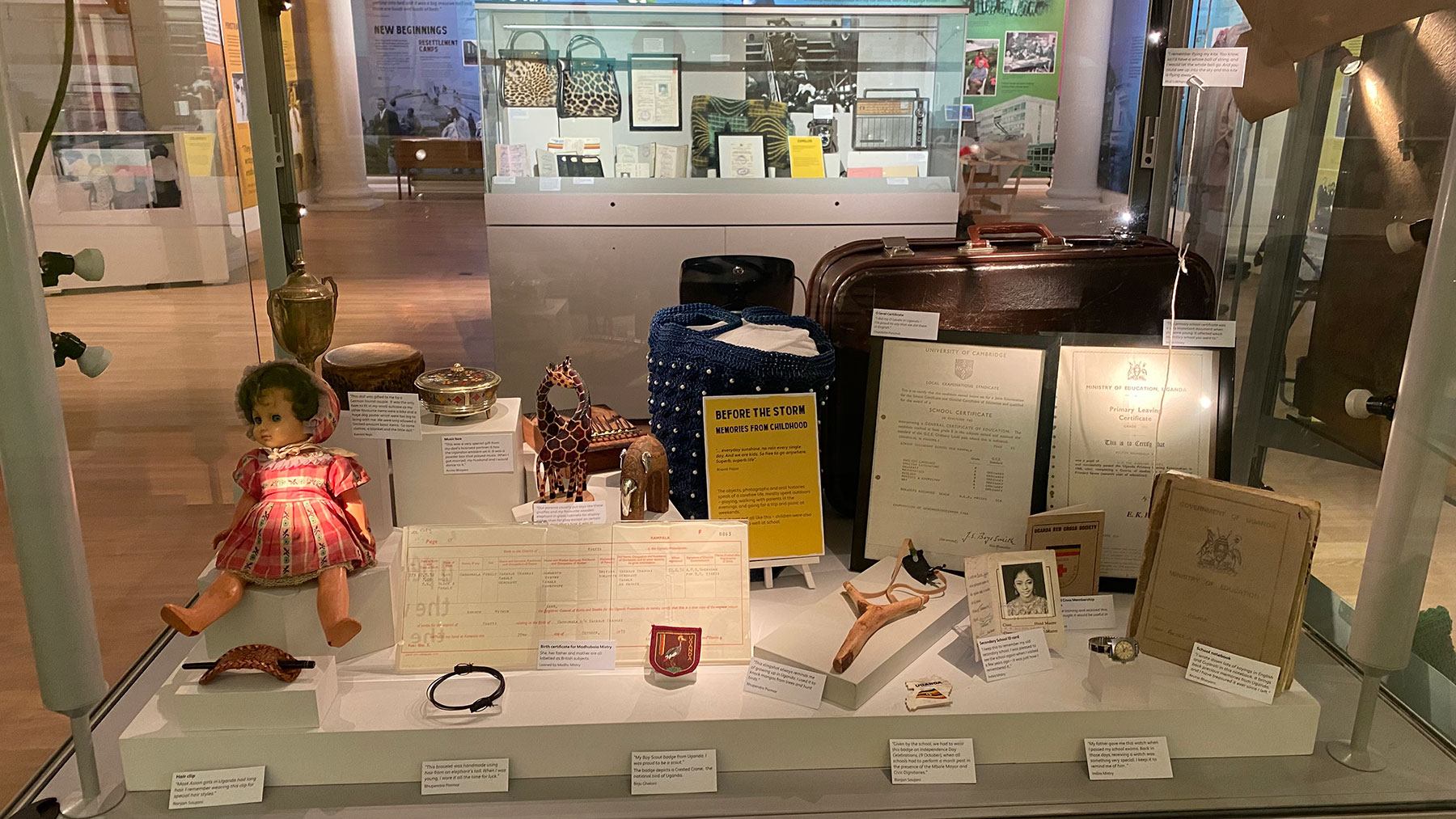
| “This slingshot always reminds me of growing up in Uganda. I used it to knock mangoes from trees and hunt birds.” ~ Bhupendra Parmar |
| “My Kalimba and African drum. In Uganda, we played music to entertain ourselves. Nowadays, I still play these for my grandchildren. You pluck the metal keys of the Kalimba to produce a sound a bit like a music box.” ~ Bhupendra Parmar |
| “This bracelet was handmade using hair from an elephant’s tail. When I was young, I wore it all the time for luck.” ~ Bhupendra Parmar |
| Birth certificate for Madhubala Mistry. She, her father and mother are all labelled as British subjects. Loaned by Madhu Mistry |
| “I received this music box from my uncle. Since then, I have used it to store trinkets from different countries.” ~ Aruna Bhayani |
| “This doll was gifted to me by a German tourist couple. It was the only item to fit in my small suitcase as my other favourite items were a bike and a huge dog poster which were too big to bring with me. We were only allowed a limited amount of basic items. So, some clothes, a blanket and this little doll.” ~ Kamini Raja |
| “Our parents usually put toys like these giraffes and my favourite wooden elephant in glass cabinets for display rather than for play, except on certain special days – that’s how it was in Uganda.” ~ Ranjan Saujani |
| Hair clip “Most Asian girls in Uganda had long hair. I remember wearing this clip for special hair styles.” ~ Ranjan Saujani |
| Embroidered flowers “My mum had embroidered these to put on a dress for me. She never did it – and she gave these to me years later. They are a great reminder to me of how much my mum enjoyed embroidering.” ~ Nisha Popat |
| “My Boy Scout badge from Uganda. I was proud to be a scout” (the badge depicts a Crested Crane – the national bird of Uganda).” ~ Birju Ghelani |
| “I remember flying my kite. You know, so I’d have a whole ball of string, and I would let the whole ball go. And you could see up into the sky and this kite is flying away.” ~ Atul Lakhani |
| Child’s suitcase “All our luggage got lost except for this case.” ~ Pankaj Popat |
| Shopping bag and photograph “This is a typical Ugandan shopping bag. Compare it to the one you can see the woman carrying in the photograph. The photograph shows people exiting a bus following their expulsion. The boy is carrying his own bag.” ~ Madhu Mistry |
| Secondary School ID card “I keep this to remember my old secondary school. I was pleased to see the school again when I visited a few years ago – it was just how I remembered it.” ~ Indira Mistry |
| “My father gave me this watch when I passed my school exams. Back in those days, receiving a watch was something very special. I keep it to remind me of him.” ~ Indira Mistry |
| “This primary school certificate was a very important document when you were young. It affected which secondary school you went to.” ~ Madhu Mistry |
| O level Certificate “I did my O Levels in Uganda – I’m proud to say that we did them in English.” ~ Chandulal Pancholi |
| “Given by the school, we had to wear this badge on Independence Day Celebrations, (9 October), when all schools had to perform a march past in the presence of the Mbale Mayor and Civic Dignitaries.” ~ Ranjan Saujani |
| School notebook “I wrote down lots of sayings in English and Gujarati in this notebook. It brings back precious memories from Uganda, and I have treasured it ever since I left.” ~ Aruna Bhayani |
EXPULSION
“And the thing happened so quickly. Our neighbours, we don’t know when our neighbours went…” ~ Babulal Hindocha
As Ugandan Asians found ways to leave Uganda, they met extremely difficult situations. Long queues to get tickets and passports and the horrors of army checkpoints added to the uncertainty that surrounded their futures.
“What can you think, what would be a priority to take with you when you see machine guns, hear the sound of the machine guns outside your house? What would you be packing?” ~ Aruna Karelia
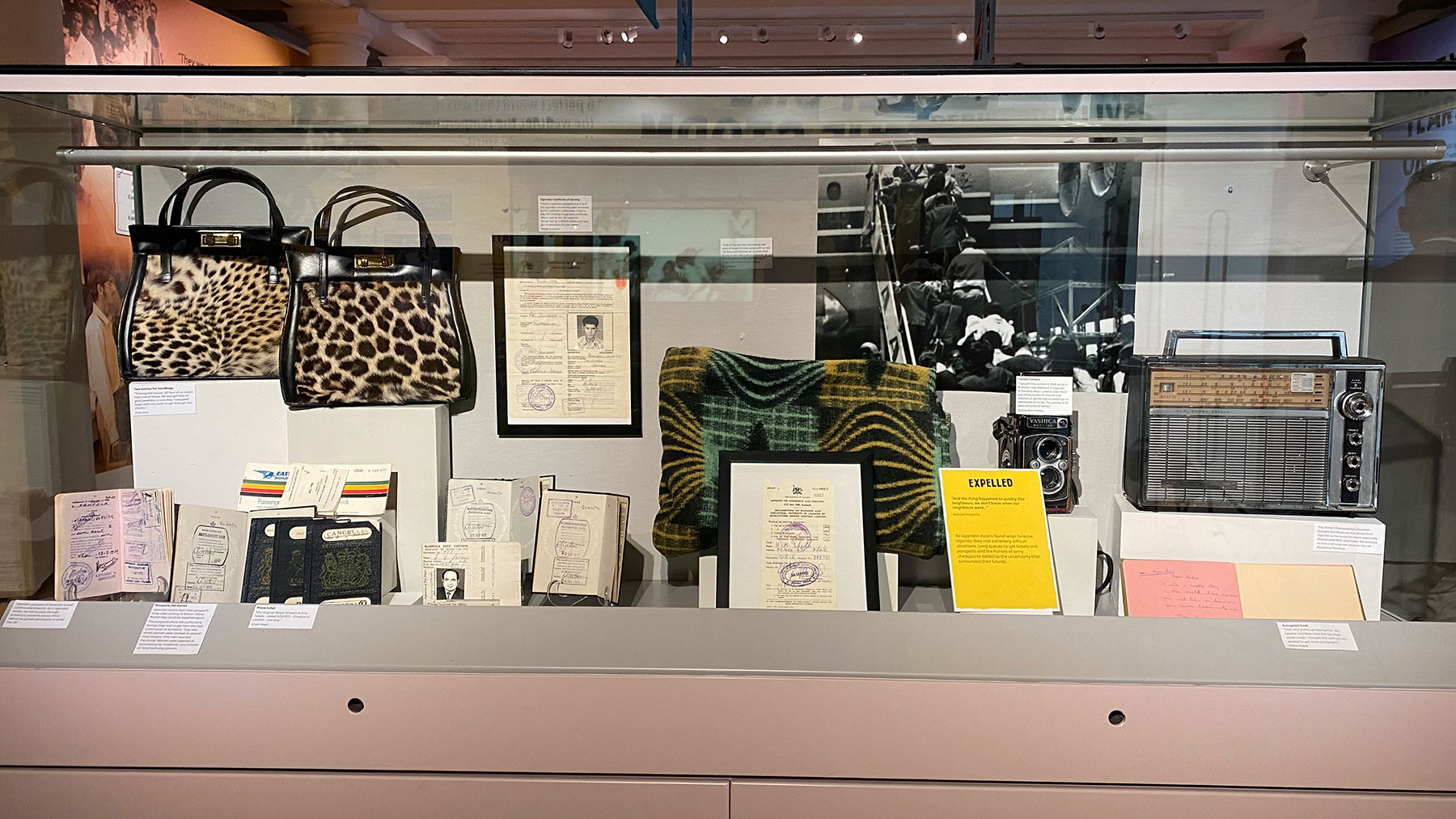
| Ugandan passport of Narendra Kumar Gordhandas Kotecha. As a Ugandan citizen, he had to pass through numerous countries across Africa before he gained permission to enter the UK. |
| Fur handbags “Tricking the troops. All four of us sisters had one of these. We brought bits of gold jewellery in one bag. I swapped bags with my sister to get through the checks.” ~ Anju Siraj |
| Passports tell stories Ugandan Asians kept their passports close long after coming to Britain. Many feared they could be expelled again. The passports show the authorising stamps they had to get from the High Commission in Kampala. They also reveal women were treated as second-class citizens. Only men received the formal stamp. Women were labelled as ‘accompanying husbands’ and children as ‘accompanying parents’. |
| Ugandan Certificate of Identity “I had a Ugandan passport, but it and my Ugandan citizenship were removed by the Ugandan authorities. I had to pay 100 shillings to get this certificate. When I got to the UK I was not recognised as a British citizen and was put in detention for two weeks.” ~ Dinesh Ruparelia |
| Reference certificate “I thought that having references would help me get a good job in England.” ~ Chandulal Pancholi |
| Plane ticket “Our original Kenya Airways Airline Tickets – dated 11/10/1972 – Entebbe to London – one way.” ~ Nutan Sheth |
| Register of business interests. All Ugandan Asian business owners had to fill in one of these forms before they were allowed to leave the country. Loaned by Nutan Sheth |
| “One of the very few belongings we were allowed to take away with us was my favourite blanket as my dad used to say it was very cold in England. It just brought comfort and a feeling of being safe in new surroundings.” ~ Kamini Raja |
| “This doll was given to me and my sister at Stradishall camp a couple of days after arriving from Uganda. She has been part of the family since.” ~ Kamini Raja |
| Junior Red Cross Membership Certificate “I did some training and received this. My dad thought it would be useful in the UK.” ~ Pankaj Popat |
| “My father Champakbhai Pancholi brought the Radio on the plane from Uganda as he loved his music especially Mohammed Rafi, and news. We listened to this a lot once we came to the UK.” ~ Rasikbhai Pancholi |
| Hand-written class register from Stradishall resettlement camp – volunteers at Stradishall set up a school class at the camp. |
Arrival
“When I came here, everything that I’d been brought up to believe was upended. People ate meat, people wore short skirts, people were disrespectful to elders. Everything you believe is questioned.” ~ Rita Hindocha
Ugandan Asians arrived in cold, grey, autumnal England with a single suitcase containing what they felt they would need in
England and could get past the Ugandan soldiers.
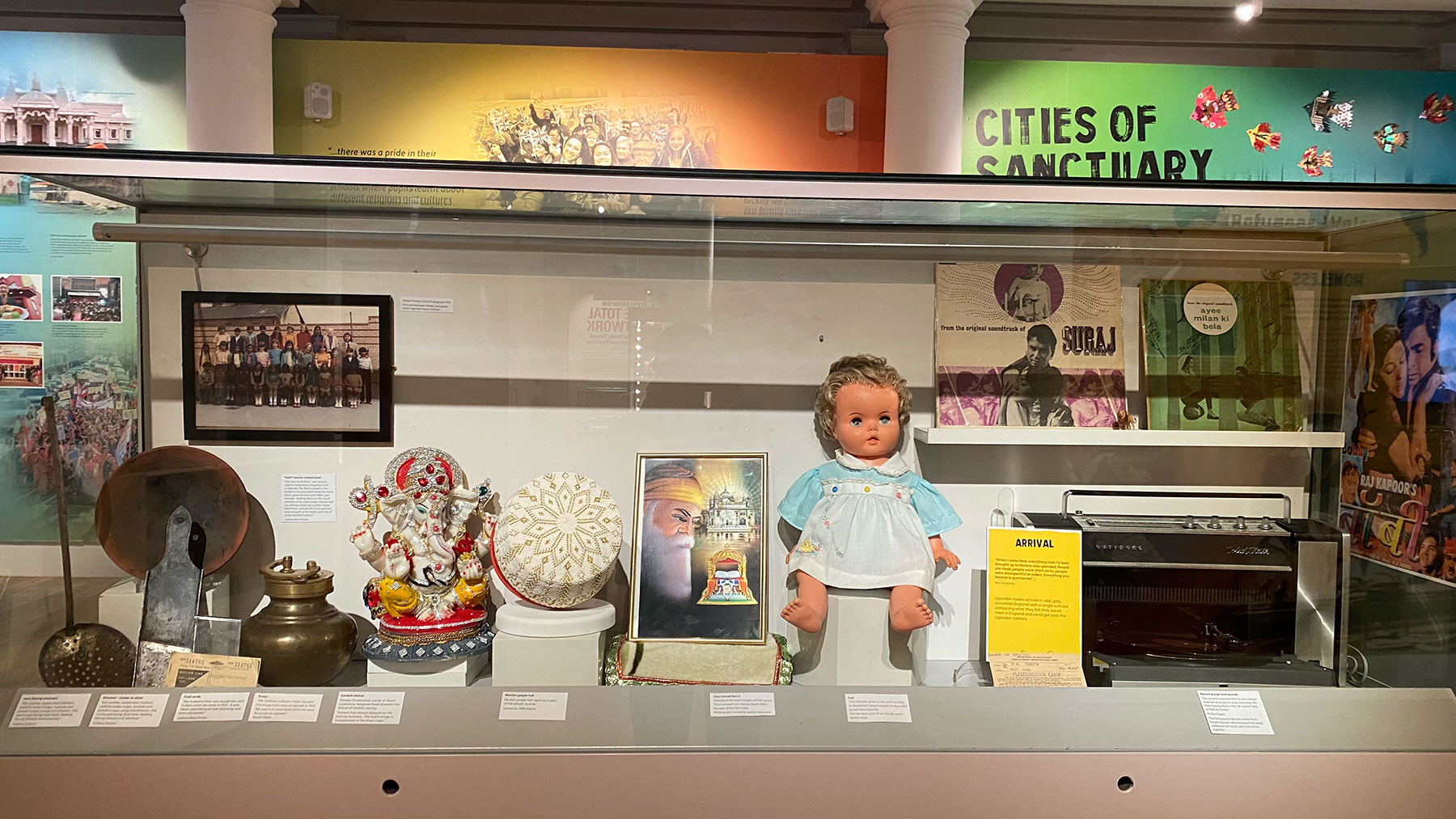
| Record player and records “My parents wanted to bring this as we always listened to music in Jinja and they felt that having this in the UK would help us feel at home.” ~ Nisha Popat The Bollywood records were loaned by Naren Kanani who brought his large collection of vinyls with him from Uganda. |
| Water container “We probably brought this just because we had no idea what life in the UK was like. We used it for family picnics in Abbey Park.” ~ Aruna Bhayani |
| ‘Tadvi’ Ceramic chapati bowl “The Clay Tavdi (Pan) was always used to make Rotis (chapatis) back in Uganda. The Rotis cooked in the modern iron pans don’t taste the same. Mum gave me hers soon after I got married. Making Roti’s on this Tavdi reminds me of meal times I shared with my siblings whilst my mother made fresh Rotis and we all in turn got hot ones straight off the Tavdi, with lots of Ghee (clarified butter).” ~ Jyotsna Atara Khoda |
| Doyo This Doyo from Uganda was used to draw out drinking water from the matungi (earthen pots) or the hando (steel / copper pots). Loaned by Damyantiben Popat |
| Khamni – Grater or slicer “My mother, Godavriben Dattani, used to make mogo, matoke and potato crisps, using this Khamni. She continued doing that here, feeding family, friends and relatives.” ~ Pratima Dattani |
| Jaro (frying strainer) “Every household in Uganda used to make nashto and mithais (savouries and sweets), especially for festivals like Diwali. My mum used this Jaro in the UK as well, one of the essential tools in an Indian kitchen. It must be about 70 years old now!” ~ Pratima Dattani |
| Fuel cards “My husband Dilip was issued this card in Kent when he came in 1972. It was never used because fuel rationing was soon abolished.” ~ Jyotsna Atara Khoda |
| Gharchoru (wedding saree) “The Gharchoru is an elaborate sari traditionally red or green in colour and given to the bride by the groom’s mother on her wedding day. It signifies the marital status and usually worn by the bride on religious Hindu ceremonies.” ~ Jyotsna Atara Khoda |
| Shoes “These are my precious possessions as they were the shoes I bought here for my wedding.” ~ Chandulal Pancholi |
| Abbey Primary Class Photograph 1974 Pictured Kamlesh Pabari, alongside other Ugandan Asian children. |
| Being able to continue to practice their faiths was essential to Ugandan Asians as they settled in Leicester. |
| Ganesh statue Dimple Chudasama, owner of Jeram superstore, Belgrave Road loaned this statue of Ganesh, saying: “Ganesh has always blessed my life and my business.” The God’s image is incorporated in the shop’s logo. |
| Guru Nanak Individuals brought images of their guru’s. This included Guru Nanak (1469–1539) – founder of the Sikh faith. |
| Muslim prayer hat Muslim prayer hat, worn as a part of the prayer routine. Loaned by Jaffer Kapasi |
| Incense stick holder Carved out of soft wood, this incense holder was used for Poojas (worship) in Uganda.” ~ Ranjan Saujani |
| Kalash “The copper ” Kalash” is used for religious ceremonies and Pujas. This Beautiful Kalash was given to me by my parents for me to use for the future ceremonies that would take place in my marital home. I have used it on many such occasions and treasure it as a spiritual gift from my parents.” ~ Jyotsna Atara Khoda |
Many people, many lives
“My daddy had to work in a factory. But everybody adopted everything, and just carried on. And I think most of the people I know, they’re all successful.” ~ Chandra Sammani
In 1972, Ugandan Asians arrived in Britain with nothing but their expertise and determination. This case explores the hurdles they faced and some of the many pathways they took to succeed.
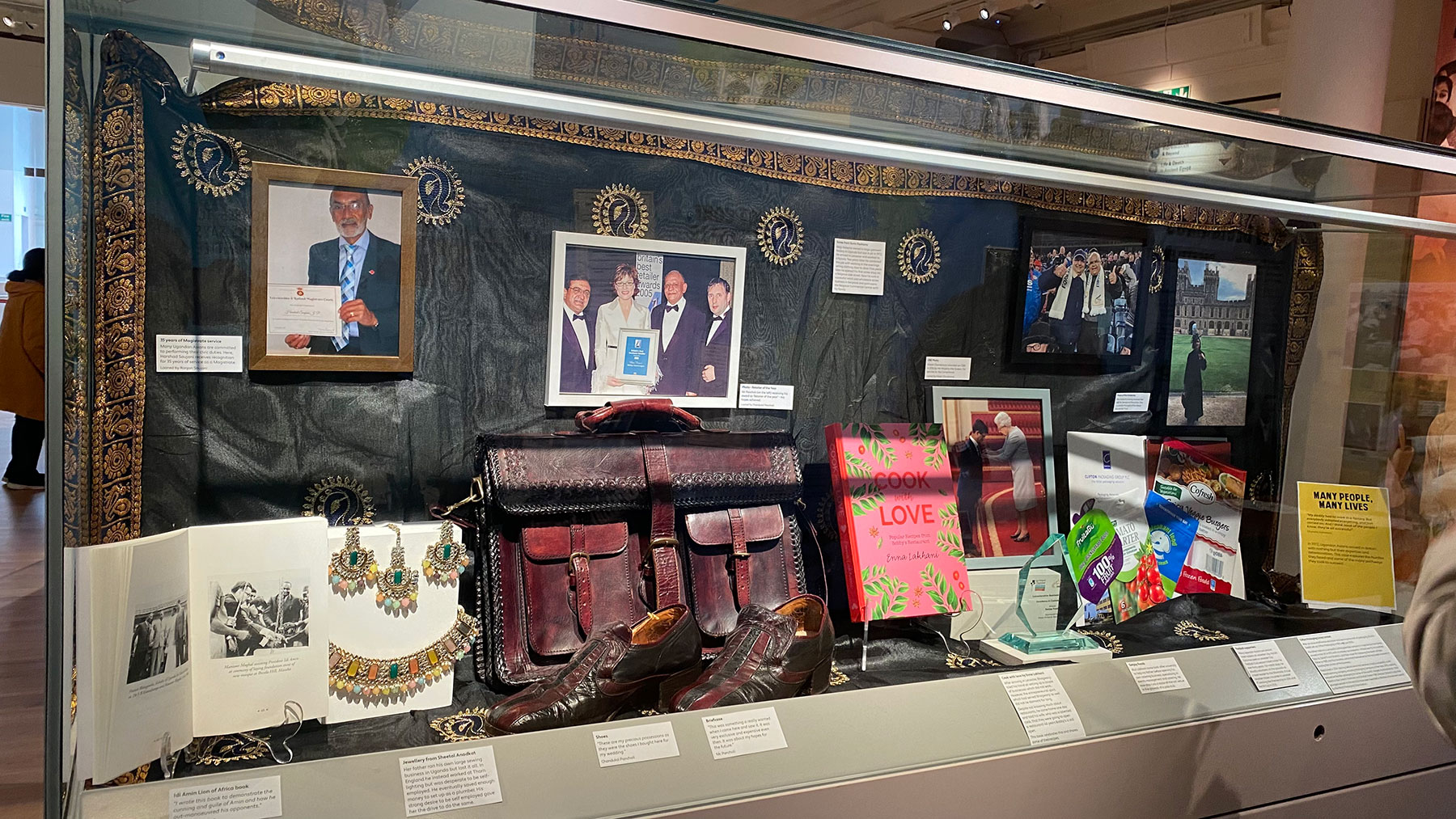
| Diwali Guide 2005 One of the first Diwali Guides. It was produced by first generation British Asians (descendants of Ugandan Asians), and young entrepreneurs Shalin, Nishil, and Meera Saujani while still at school and college in Leicester. Loaned by Ranjan Saujani |
| Cook with love by Enna Lakhani After arriving in Leicester, following the expulsion Bhagwanji searched for work and tried his hand at setting up a couple of businesses which did not work. However, the entrepreneurial spirit which had served Bhagwanji so well did not lie dormant for long. Despite not knowing much about restaurants or going out to eat, he came home one day and told his wife who was a talented cook that we are opening a restaurant! 46 years Bobby’s is still open on. This book celebrates this and shares these recipes. |
| 2012 Olympic Torch and photograph “I was very fortunate to have been nominated to carry the Olympic Torch for the London 2012 Olympics and the Special Olympics in Leicester in 2009, in recognition of my community work.” ~ Ranjan Saujani |
| Idi Amin Lion of Africa book “I wrote this book to demonstrate the cunning and guile of Amin and how he out-manoeuvred his opponents.” ~ Manzoor Moghal |
| DMU Dance Degree “I was the first to get a degree from De Montfort University specialising in Indian dance.” ~ Priti (Rajshree) Raithatha |
| Dance jewellery and photo “This jewellery is part of my dance costume.” ~ Priti (Rajshree) Raithatha |
| Service of Thanksgiving, 25 years Westminster Abbey Order of Service from a Service of Thanksgiving at Westminster Abbey, commemorating 25 years since the expulsion. Loaned by Birju Ghelani |
| Madhvani Magazine “I used to work for the Madhvanis in Uganda and still get the magazine – I like to keep in touch.” ~ Babulal Hindocha |
| Certificate – Typewriting,
Typewriting award to Jyotsna Mashru “When I first came to England, I wanted to get as many qualifications as I could, so that I could get a good job in an office.” |
| Photo of Rita Hindocha Rita Hindocha having received her MBE for Services to Education. She is currently Principal of the Mead Educational Trust. |
| OBE Photo Hitesh Chandarana awarded an OBE in 2016 by Her Majesty the Queen, for services to Tax Compliance. Loaned by Hitesh Chandarana |
| 35 years of Magistrate service Many Ugandan Asians are committed to performing their civic duties. Here, Harshad Saujani receives recognition for 35 years of service as a Magistrate. Loaned by Ranjan Saujani |
|
Football supporters Many Ugandan Asians are season ticket holders at Leicester City. Harish Karia has been a Leicester City Football Club season ticket holder for over thirty years. On match days, he proudly volunteers at the grounds as a team leader for the Marshalls. A true Leicester citizen, his pride is Leicester FC winning the Premiership in 2016 and the FA Cup in 2021. |
50 Years On
“They came with nothing. And if you walk down Belgrave Road and Melton Road, you’ll see how much they took on the challenge of creating home here.” ~ Sanjiv Patel
In 1972 Ugandan Asians were told they were a threat to the very fabric of the city. Fifty years on they are an essential part of that fabric. It is impossible to imagine Leicester without the Golden Mile.
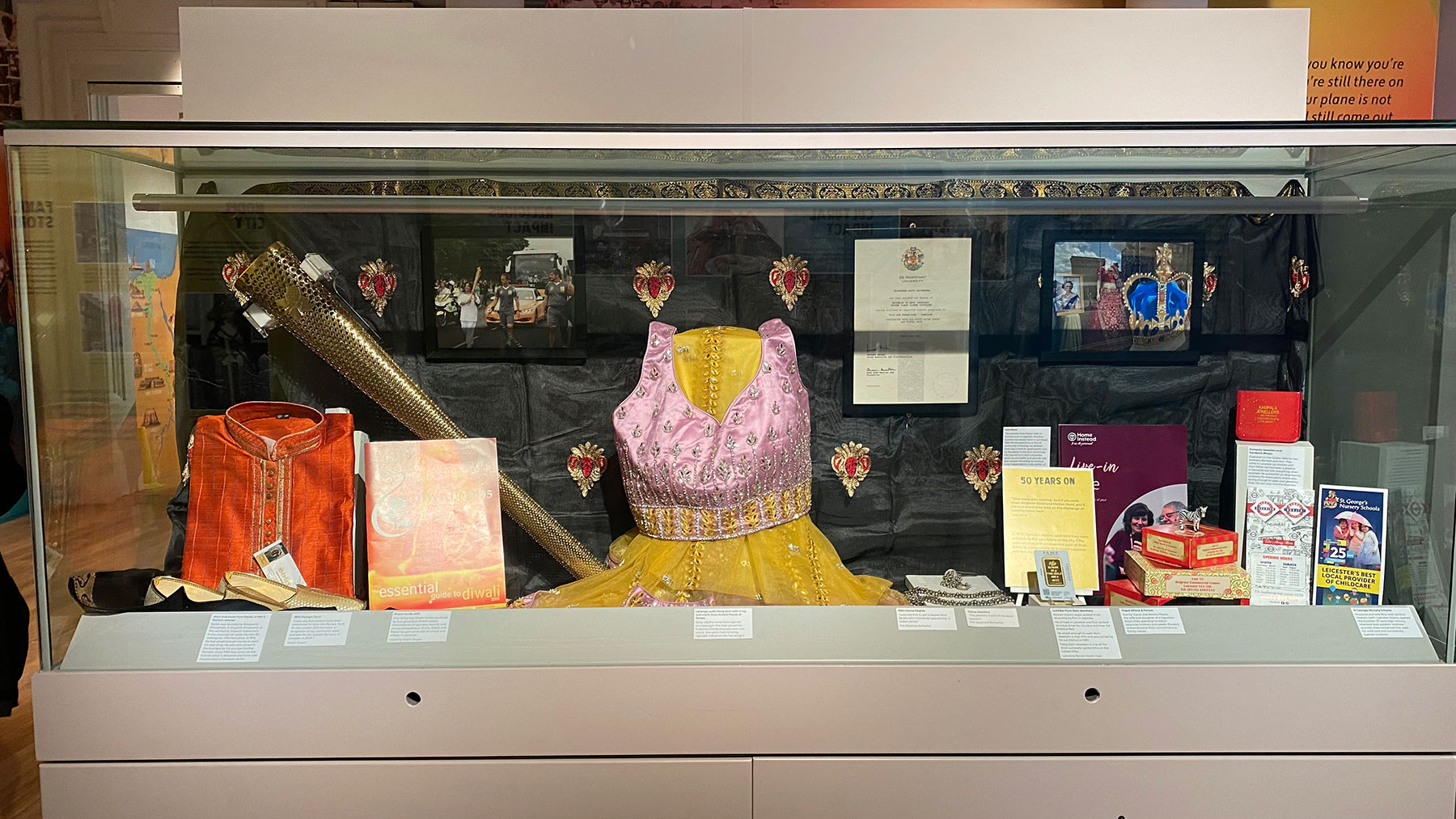
| Kampala Jewellers and Sandwich Bhajia Operated on the Golden Mile by two brothers, Ramesh and Atul. They came to Leicester as children with their father. He had been a jeweller in Kampala but lost everything when expelled. He worked for an engineering company for many years, saving. Eventually he had enough to open as a jeweller. His son now runs the business. The younger brother was six when expelled and was always interested in catering. He worked for Trust House Forte for many years before 5 years ago opening his own business. |
| Lehenga outfit (long skirt with a top and scarf), from Anokhi House of Sarees. Ranju Modha came from Uganda as a teenager. She later joined her husband’s family business and now runs it. She works hard to bring Ugandan influence into her designs. |
| Jewellery from Sheetal Anadkat. Her father ran his own large sewing business in Uganda but lost it all. In England he instead worked at Thorn lighting but was desperate to be self-employed. He eventually saved enough money to set up as a plumber. His strong desire to be self employed gave her the drive to do the same. |
| Saree from Surin Fashions Walji Kotecha owned a large garment factory in Uganda but lost it all in 1972. He arrived in Leicester and worked in a factory. Two years later he combined this job with working in the evenings selling clothing door to door. Five years later he opened his first saree shop on a Belgrave side street. Now he runs a successful retail and wholesale saree business in Belgrave and part-owns the Belgrave Commercial Centre with his family. |
| Sanjay Foods Atul Lakhani came back after university to help his father before opening his own catering business, specialising in events management and catering. He now also runs a state-of-the-art venue in the grounds of a polo club. |
| Popat Mithai & Farsan Run by Vijaya and Banshri Popat, the wife and daughter of a Ugandan Asian, they specialise in Indian savouries (mithai) and sweets (fardan) and emphasise their commitment to family values. |
| Shirt and shoes from Stylex, a men’s fashion retailer. Stylex was founded by Bhagwanji Bharakhda whose father had run a tailoring business in Uganda. In England, Bhagwanji at first worked at Imperial Typewriters. In the evenings he made trousers for colleagues. After two years, in 1974, he had saved enough money to open his own shop. He was later joined in the business by his younger brother Ramesh. Since 1988 they have run the fashion shop in Belgrave and have now incorporated a footwear centre. |
| St Georges Nursery Schools Husband and wife Birju and Jaimina Ghelani, both Ugandan Asians, opened the business 29 years ago. Having inherited their parents business and acumen skills they recognised the need for child care and successfully opened nurseries. |
| Gold Bar from Ram Jewellers Raman Visram Jogia worked in an accountancy firm in Uganda. He arrived in Leicester and first worked as a bus driver for City Bus and then for Midland Red. He saved enough to open Ram Jewellers in Feb 1974 and was joined by his son Mahul in 1983. Today Ram Jewellers is one of the most successful goldsmiths on the Golden Mile. Loaned by Raman Visram Jogia |
| Clifton Packaging Group Limited After an accounts/finance education and learning the craft of packaging, Khalid Sheikh set up Clifton Packaging in 1981 with just £500. His father had run a successful clothing/textiles company in Uganda but the family arrived in the UK in 1972 with no money nor prospects – Khalid was 15, his brothers Tahir 14, Zahid 11 and Shahid 4, and their sister 18. Following the death of their father in 1985, the four brothers committed themselves to the hard work involved in building the success of the business. Khalid died in 2014, leaving behind what has become a highly successful, multi award-winning company, including Packaging Company of the Year, 2019, making innovative flexible packaging for some of the world’s largest multinationals. Tahir Sheikh is the current Chairman and Shahid Sheikh OBE Director. Shahid is also the youngest person in the world to have been awarded a lifetime achievement award by the World Packaging Organisation. |
| Care Home “Our parents have always been in business even in Uganda, therefore business has always been in our blood. With the life expectancy in the UK continually increasing, we realised there was a need for good quality care for the elderly in the local community. This inspired us to start a business which would enable us to provide care that allowed the elderly to continue living independently in the comfort of their own homes.” ~ Nisha and Bhavesh Chandarana |
